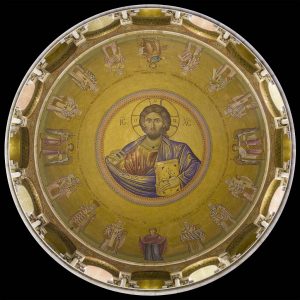
Today I’m wrapping up my series on “How to Have a Good First Visit to an Orthodox Church.” Six posts, not counting this one. (Click here to start at the beginning.)
If you are a Protestant that probably sounds a bit like overkill. You know newbies don’t need much help when they visit your church.
But worship in an Orthodox church is a really cross-cultural experience. Going through those doors and under the dome feels like traveling to another country — and as a visitor you know you don’t speak the language. You need a Lonely Planet guide, or a Protestant to Orthodox/Orthodox to Protestant Dictionary to find your way around.
My aim in this series has been to give you that guide. I figured if you understood six or so major contrasts between worship in the West and the Orthodox East you would be ready to take in the rest on your own.
Really, though, I’ve barely scratched the surface. (See how little I’ve said about the fine points of theology!) This is just the stuff that smacks you in the face, making the experience so very different.
And it is the experience you should aim for.
Lay aside your need to follow along in a book. Just take it in though all your senses.
On your next visit, and the next, you will hear more of the words, notice more of the visual symbols. You will build understanding bit by bit. But the thing to do at first is just experience it.
Religionfull Christianity?
But if you do take in the experience, even with my six big contrasts in mind, there is one thing you are likely to say about Orthodoxy:
It’s so… religious.
And if you are a Protestant, you probably think that is a problem.
We Protestants have a saying.
Christianity is not a religion …
we like to say,
… It’s a relationship.
We’ve come to assume this so completely that we think it comes straight from the Bible. It doesn’t. It comes from our tendency to distill the faith down to its essence, and then think that everything except that essence should be tossed.
The essence we value is the personal encounter of a Christian with God, the transformation of an ongoing relationship of love and trust with Jesus himself. We value that relationship, that inner immediacy of faith, so much that anything outward, anything “religious,” is a problem.
An amazing variety of things brings out our scathing criticism. Anything from vestments to liturgies to shared spiritual practices has us complaining,
It’s too religious.
If we see something, anything, that smacks of formality or ceremony, we think it is a sign that real faith is gone — or at best faith is in the process of dying. We cry
Empty ritual!
Many of us cannot think of that word “ritual” without the modifier, “empty.”
Your experience of Orthodox worship, even of one Sunday Liturgy, is going to show you a lot of ritual. You’ll see a lot of vestments. You’ll hear a lot of pre-written prayers. In fact the only thing that won’t be scripted will be the sermon and the announcements.
But if you ask them they will tell you: these rituals are not empty. They are full. Full of meaning and full of life.
What Orthodoxy shows you is not a contrast between “religion” and “Christianity.” It is a contrast between the West’s “religionless Christianity” and the East’s “religionfull Christianity.”
Religionless Christianity
We think our opposition to “religion” is something from the roots of our Protestant faith — but Luther, Calvin, and the rest didn’t want to eliminate religion. They wanted to correct it.
They wouldn’t brag that the churches and movement they were part of were “not religious.” They would say it was the “true religion — it was authentic Christianity.
Our opposition to “religion,” in my not-at-all-humble estimation, has at several roots:
First is our emphasis on the preaching and hearing of the Word, which pushed away anything that didn’t have a verbal focus.
Second is our 16th-century opposition to idolatry, which actively removed most visual elements from worship.
Third is the 17th-century English Reformed opposition to the Anglican Book of Common Prayer. At the Westminster Assembly they took careful aim at Anglican priests who lifelessly read the liturgy, and created a new mode of worship. Presbyterian pastors would now structure services according to a Directory for Worship but they would always pray and lead in their own words.
This became the Protestant norm. Heartfelt piety always, please, and not rote performance.
Fourth, and most troublingly, was Dietrich Bonhoeffer, the German Lutheran pastor and theologian who, from a Nazi prison cell, suggested that what was needed in 20th century Europe was “religionless Christianity.” The evocative phrase has been snatched up to give an intellectual authority to the evangelical derision of all things “religious.”
Religion AND Christianity — A Bowl for a Pearl of Great Price
If you take courage and spend even one Sunday morning experiencing an Orthodox Liturgy, try thinking of “religion” in a new way.

Think of religion as a kind of bowl to carry something of great value. You need a bowl to carry treasure, maybe a whole lot of slippery pearls. You don’t want to lose them. You want them to be there, intact, so you can give them to your children, or your neighbor.
What the Orthodox have is an excellent bowl. Those rituals, those hymns they’ve been singing for over a thousand years, those vestments with all their symbolic meanings, the icons, the incense, the entrances, the sacraments — they are there to carry something of enormous value.
The religion is there to carry the real Christian faith. And they have carried it, from old to young, parents to children, generation to generation, for two thousand years.

Without “religion,” Protestants can’t carry the treasure safely. You may have noticed that we Protestants, for all of our intense personal relationships with God, have a hard time passing the faith to the next generation. We try to carry the treasure in our personal hands — and like water it slips through.
People keep coming to Christ, and so many churches grow. But in church after church you hear the complaint that the younger generation doesn’t come back. In family after family you find parents longing for their children to come to faith — but they don’t.
What we Protestants lack is a good bowl to carry our treasure in. The treasure of an intimate, life-giving relationship with Christ keeps slipping through our fingers as we try to pass it on.
You might notice how few people raised in Orthodox churches find their way into Protestant pews later in life. The Orthodox faith, which uses a believer’s whole body and soul not only on Sunday morning but in living the faith, has staying power. That bowl which is religion carries the pearl of great price, living faith, into their hearts and minds and wills.
There seem to be far more who are raised Protestant but find themselves converting to Orthodoxy. The wonder, the awe, the mystery laden with the grace of God, draws them. The bowl that carries the treasure from parents to children can also carry it to newcomers.
Sure, it is possible to pick up a nominal version of Orthodox faith, just as you can be a nominal Protestant. But any Protestant who assumes that Orthodox Christians aren’t “real” Christians, that they don’t have an intimate and transforming relationship with God, is simply mistaken. They may talk about their love for Christ differently — but their faith is real and strong.
If you want to step under the dome some Sunday but don’t know where to go, here’s a parish locator that includes all branches of the Eastern Orthodox Church found in North America. Just plug in your zip or postal code and see what comes up.
Once you find one near enough to visit, check the website for times. You may need to call to make sure the Liturgy is in English. And ask for recommendations on what to wear — you’ll want to be a good guest, just as they’ll want to be hospitable hosts.
Then go. Light a candle if you want. Let the experience of worship, ancient, modern, and heavenly, wash over you. Pray and praise; listen and learn; stand and sing. Enjoy!
++++++++++++
This post is the conclusion of a seven-part series. To read from the beginning start here. At the end of each post is a link to the next.
I’d love to send all my new articles, along with other announcements, straight to your inbox. Scroll down to the black box with the orange button to subscribe to my weekly(ash) newsletter and all this will be yours…

Nooooo! It’s over? 🙁
For what it’s worth, it was a series I enjoyed. But I might be biased.
I love your bowl image. Fr. Barnabas Powell, an Orthodox priest, has a video series called, “A Journey to Fullness.” I courage everyone to check it out. In that series, he has an image that’s a lot like yours. He says there are a lot of Christians that are on fire with the Holy Spirit, but they often burn their houses down because they don’t have a fireplace. The Orthodox Church, he says, is that fireplace.
Thanks for your encouragement, Fr Dustin!
I think these seven are sufficient for a FIRST visit.
(If you or other interested parties want to suggest other things newbies find deeply disorienting, or which insiders would say are truly necessary for visitors, do let me know. Of course if Orthodox think something is really necessary for visitors to know I’m likely to wonder, suggestively, why they don’t say it to visitors…)
I could conceivably do another series on one’s SECOND visit. That might go into key theological emphases, practices of Orthodox life, and what not.
Thoughts?
In regard to Protestant objections to so-called empty ritual:
I’m reminded of a theater professor who was trying to explain method-acting as I was seated in a chair taking notes.
“Stand up,” he said. “And when you do, raise up your arms.”
I did so.
“Notice how just getting up and doing that changes how you feel.”
He was right.
Not a few actors learn to “access” genuine feeling by working from the outside in — by doing things with their bodies that helps them set an “inner tone.”
Religious ritual works the same way. Ritual at its best “tutors” the feelings from the outside in. Cultivating a habit of praying before an icon, lighting a candle, and so forth can work on worshipers on a subliminal level. Over time, such a learned language of worship can sustain people during times of dryness or despair.
A spirituality without religion is a frail reed indeed.
Brilliant. Thanks Gary.
Thanks Neal. Appreciate if you could let me know your convictions, Is it Mere Christianity or Protestant Solas?
Hi Binoy.
My name is Gary. I include my middle name “Neal” in the website and publications to clarify who I am in relation to a variety of other ministers and writers named “Gary Hansen.”
As to my convictions, I have over 400 posts on this site and I invite you to read them. I don’t hide my views.
Feel free to email and tell me a bit about yourself sometime.
Blessings,
Gary
I really enjoyed reading this. The points you brought out in bold and the imagery with the bowl really are a great way to reclaim the beauty in ritual, tradition, and history. Thank you for this!
Thank you Jennifer! Your encouragement means a lot.
Great to hear from you. I hope you are doing well and would love to know where life and ministry are taking you.
Blessings,
Gary